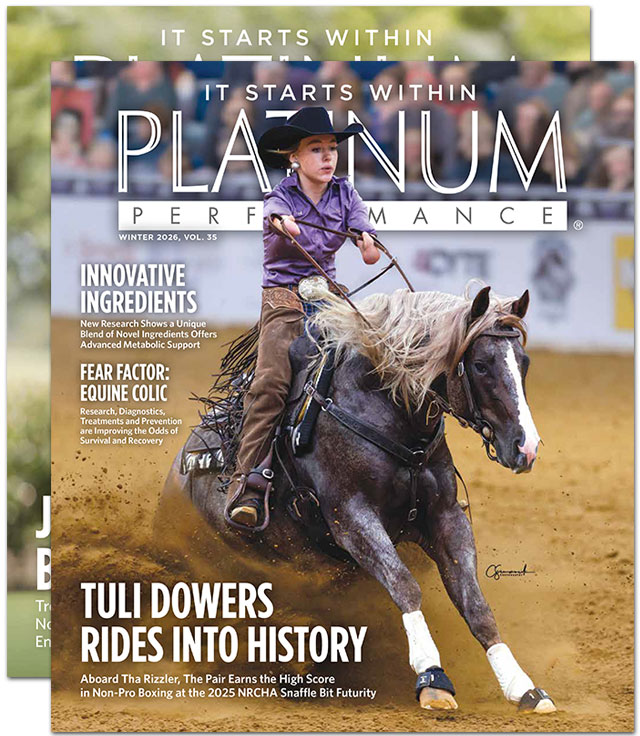Nature Knows Best
A Theory Supported By Research & Scientific Results
Horses weren't always domesticated. In fact, they once roamed free, evolving on a diet of grass, tree bark and other forage found on the nutrient-rich grasslands that were their native habitat. This diet was high in antioxidants and omega-3 fatty acids. As horses became more domesticated, well-intending owners shifted the equine diet to an approach that fit the parameters of feeding a more confined animal. This more modern diet often includes grains, concentrates and cut hay, and provides a higher level of pro-inflammatory omega-6 fatty acids and free radicals than the horse was designed to consume.
Omega-3 Fatty Acids, Antioxidants & Your Horse: Why Do They Matter?
You’ve heard the adage, “you are what you eat.” Like many things, it may be old, but it’s wise and continues to hold true. Since horses are unable to synthesize crucial omega-3 fatty acids within their own bodies, they rely on their diet to provide these and other essential nutrients. This makes the ratio of omega-3 fatty acids to omega-6 fatty acids in your horse’s diet of paramount importance.
Equally as vital are the antioxidants present in your horse’s body. Known as the quiet warriors, antioxidants are responsible for fighting off damaging free radicals and protecting cells. Free radicals can be caused by everyday interactions with things as common as dust, environmental pollutants and intense exercise. Cellular health may not often be top of mind when considering your horse’s longterm well-being, but in actuality your horse is a walking compilation of trillions of cells. If the cells are healthy, the horse’s health typically follows suit. Antioxidants come into play in virtually every aspect of a horse’s health, including the joints. Providing your horse with supplemental antioxidants helps support the body’s natural defenses against free radicals since it takes one antioxidant molecule to combat every one free radical.
What Hay Delivers and When Supplementation Can Help
High quality forage is the foundation of the best feeding programs, but the challenge lies in creating a complete diet with hay alone while feeding only a moderate to minimal amount of grains and concentrates, if any at all. The importance of a more natural diet cannot be underestimated. Starting with the right hay is crucial, but realizing exactly what your hay is providing — and what it’s not — is equally as lofty. For instance, the level of omega-3 fatty acids and antioxidants in fresh, still growing alfalfa is 38-40% higher than the same alfalfa just 6 weeks post-harvest. With nutrient rates diminishing over time in even the highest quality hay, the bailed hay we feed our horses stops short of delivering all of the necessary nutrients a horse needs to function at their best, making supplementation an excellent choice. This nutrient gap is one of the primary reasons Platinum Performance® Equine was developed to provide a healthy source omega-3 fatty acids and antioxidants, along with the trace minerals and vitamins that have diminished in hay over time. By combining a forage base with the right supplementation, a feeding program can be made not only simple but ultimately effective, well rounded and complete.
Supplementing horses on a forage-based diet, or those that are being fed moderate grains or concentrates, can complete the picture and help horses to more efficiently process calories and maintain an ideal weight. This approach was tested at the University of California at Davis, where researchers studied eight horses fed a diet of oat and alfalfa hay. Each of the eight horses then had their hay reduced, replacing it with Platinum Performance® Equine and creating a diet of equal caloric value to their former hay diets. After 11 weeks of supplementation, 87.5% of horses gained weight on the diet of hay and Platinum Performance® Equine without a significant increase in energy consumption. The studied horses were able to maintain weight due to their consumption of nutrient-dense calories from Platinum Performance® Equine working in conjunction with their hay diet.
Research Supporting the Natural Diet
Influence of Diet on Colic Rates
Nathaniel A. White, DVM; Marion
duPont Scott Equine Medical Center, 2006
Summary: Low grain consumption can play a role in decreasing the rate of equine colic. Horses that consumed higher amounts of grains and concentrates had increased odds of experiencing a colic episode.
Results: A horse’s odds of colic increased from less that 1 with a diet that included no grain, to over 4 with a diet that included 2.5-5.0kg of grain. When a horse’s diet included >5.0kg of grain, their odds of colic increased to over 6.
Allergic Responses
University of California, Davis, 2009
Summary: Studies performed by researchers at the University of California at Davis compared the allergic responses in horses before and after supplementation with omega-3 fatty acids, vitamins and trace minerals when exposed to common allergens.
Results: Allergic responses were evaluated before and after 11 weeks of supplementation. There was as much as a 50% reduction in allergic response to some antigens.
Pregnancy Rates
Colorado State University, 2008
Summary: Researchers at CSU's Equine Reproduction Lab studied mares, ranging from 6 to 25 years old (average = 20), most of which with histories of suboptimal fertility. Eggs were harvested from the mares and implanted into recipients, either as fertilized eggs (embryos) or as unfertilized eggs, after which the recipient mare was inseminated. Pregnancy rates were approximately 23% per transfer initially.
Results: At the start of the study, the mares consumed a hay diet supplemented with a commercial complete feed. Mares were then fed a mostly hay diet supplemented with Platinum Performance® Equine for 8 to 16 weeks. Eggs were once again harvested from supplemented mares and transferred to recipient mares. This time the pregnancy rates in the recipient mares significantly increased to 51%, which was a 129% increase.

by Jessie Bengoa,
Platinum Performance®

